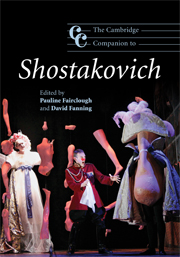Book contents
- Frontmatter
- Introduction
- PART I Instrumental works
- PART II Music for stage and screen
- 6 Shostakovich and the theatre
- 7 Shostakovich as opera composer
- 8 Shostakovich's ballets
- 9 Screen dramas: Shostakovich's cinema career
- PART III Vocal and choral works
- PART IV Performance, theory, reception
- Notes
- Select bibliography
- Index
9 - Screen dramas: Shostakovich's cinema career
from PART II - Music for stage and screen
Published online by Cambridge University Press: 28 September 2011
- Frontmatter
- Introduction
- PART I Instrumental works
- PART II Music for stage and screen
- 6 Shostakovich and the theatre
- 7 Shostakovich as opera composer
- 8 Shostakovich's ballets
- 9 Screen dramas: Shostakovich's cinema career
- PART III Vocal and choral works
- PART IV Performance, theory, reception
- Notes
- Select bibliography
- Index
Summary
By the time Shostakovich's opera The Lady Macbeth of Mtsensk District was condemned in 1936, over half of his forty numbered opuses were dramatic works: two operas, three ballets, seven theatre scores, and nine film scores. His juvenilia include dramatic and programmatic pieces and throughout his career he continued to write such works. But after 1936, for a variety of reasons both political and practical, his dramatic output fell away, often leaving him collaborating on politically acceptable work with friends: he seems not to have enjoyed theatre work, his ballets had been negatively received, and after the mauling of Lady Macbeth he did not complete another opera (only the operetta Moscow, Cheryomushki). His film music was left as the only outlet for his dramatic talent.
His professional introduction to cinema came in 1924, as he helped support his family by becoming a cinema pianist. His enthusiasm soon waned: not only did this hackwork compete with his conservatoire studies, but there were few opportunities for him to develop new approaches to dramatic music. Happily, the First Symphony's success allowed him to drop the work in 1926, but he was lured back to the cinema when the Leningrad studio Sovkino commissioned a score to be performed live to New Babylon (1929), a film about the Paris Commune. The directors, Grigory Kozintsev and Leonid Trauberg, led FEKS (acronym for Factory of the Eccentric Actor) and, with their desire to shock and surprise the audience, they offered just the sort of freedom Shostakovich had craved in the cinema pit.
- Type
- Chapter
- Information
- The Cambridge Companion to Shostakovich , pp. 213 - 228Publisher: Cambridge University PressPrint publication year: 2008

